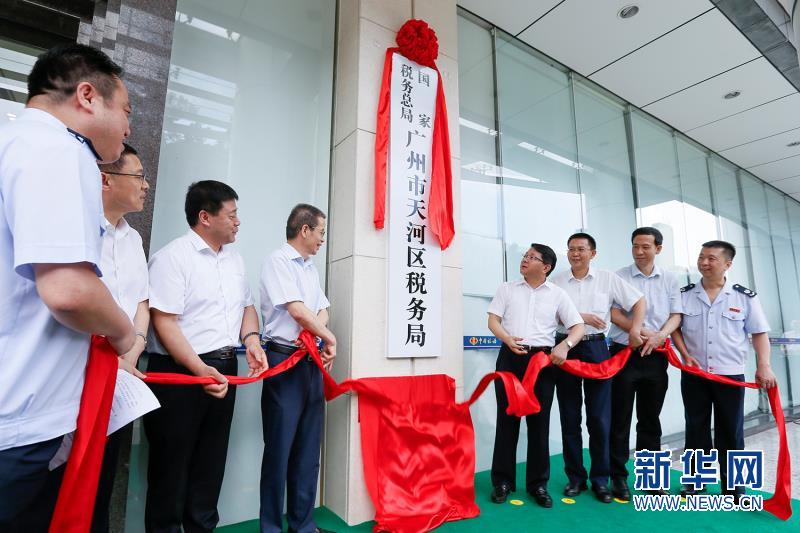Guangdong: Guangzhou’s institutions merge to facilitate tax collection.

On July 20th, Guangzhou’s urban and township tax agencies merged, and all district-level new tax bureaus and their township-level tax branches (tax offices) were listed simultaneously, marking the completion of the merger and listing of Guangzhou’s three-level tax agencies. After listing, it will carry out law enforcement and services in the name of the new tax agency, and handle all kinds of tax-related matters directly for taxpayers. On the day when Guangzhou Taxation Bureau completed the reform of tax institutions at all levels in the city, it took many new measures to facilitate the people and enterprises, and really turned the merger of national tax and local tax institutions and the reform of the collection and management system into a tangible and intimate convenience for taxpayers.
Say goodbye to "running at both ends" and run out of "acceleration"
Before the reform of the tax organization, Guangzhou Pharmaceutical Group Co., Ltd. was in the state of co-management of national tax and local tax, and its value-added tax and enterprise income tax were collected and managed by the national tax department respectively. In addition, there were many series of brand products such as Wang Laoji and Huatuo Zaizao Pills, and various complicated tax matters occurred frequently. It has always been a long-standing problem to run at both ends and ask questions at both ends. The reform of national tax and local taxation institutions is a great boon to a large enterprise like Guangzhou Pharmaceutical Group. According to the relevant person in charge of Guangzhou Taxation Bureau, in the future, taxpayers only need to submit one set of the same information, only need to apply for the same tax-related matter once, and all tax-related and fee-related businesses can be completed in the same hall. This made Huang Yuyun, the financial director of Guangzhou Pharmaceutical Group, bid farewell to the era of "running at both ends" completely. "The convenience brought by the reform of tax institutions, we will try it in the first time." Huang Yuyun said with a smile, GPHL signed a transaction contract with an overseas company on the franchise use of the trademark "Wang Lao Ji". As the domestic agent of the other company, the enterprise needs to withhold and remit the enterprise income tax and value-added tax of this transaction. "In the past, it was necessary for both parties to consult, prepare two sets of materials and go through two processes, but now it only needs one set of materials and one set of processes to get things done in one place."
According to statistics, since May, Guangzhou tax authorities have realized the tax-related (fee-related) business in one hall, handling 1,393,400 national tax business, effectively solving the problems of taxpayers going back and forth to tax authorities many times and queuing up at multiple windows to pay taxes, and fully realizing the effects of "reducing links, optimizing processes, reducing time limit and improving efficiency". In June 2018, the average waiting time of the city’s tax service hall was 5.07 minutes, and the average processing time was 3.63 minutes.
Yu Haifeng, president of Guangdong University of Finance and Economics and an expert in finance and taxation, said that the reform of tax institutions can effectively reduce the institutional cost of tax collection, improve the efficiency of tax collection and management, and achieve a win-win situation for finance, enterprises and individuals.
Leverage Internet thinking to make small invoices no longer a worry.
When it comes to taxes, most people will think of invoices at the first time. A small invoice is the most concerned factor in tax activities, and it is often the "top priority" of enterprise accounting. In order to help taxpayers manage small and heavy invoices, "blockchain" has also become the source of inspiration for Guangzhou Taxation Bureau. The bureau launched the "tax chain", the first electronic invoice blockchain platform in China, and successfully solved the problems of traditional electronic invoices, such as security risks, information islands, difficult verification of authenticity, data tampering, repeated reimbursement, and difficult supervision. Mr. Li, deputy general manager of the finance department of Guangzhou Gas Group Co., Ltd., a large billing company, said: "Our company has to issue more than 7 million electronic invoices every month, and it needs to arrange special personnel to track the flow of invoices, which is extremely heavy; Access ‘ Tax chain ’ After the platform, the platform can monitor the invoice destination in real time, automatically remind the payee of the receipt situation, and at the same time realize the automatic backup of invoice data, which will save a lot of manpower and equipment costs. " Ms. Tian, the tax manager of Lee Kum Kee (Guangzhou) Food Co., Ltd., a large ticket recipient, said: "The company obtains electronic invoices from multiple platforms every month, which is very cumbersome to manage, and access ‘ Tax chain ’ After the platform, electronic invoices are automatically collected without obtaining from multiple platforms, which greatly improves work efficiency, and at the same time ‘ Tax chain ’The entry mark of invoices is recorded on the website, which will completely solve the problem of repeated reimbursement of electronic invoices. The convenience and security brought by electronic invoice and blockchain make taxpayers full of confidence in the future tax prospects.
After the listing ceremony of the regional bureau on the same day, the relevant person in charge of the Guangzhou Municipal Taxation Bureau said that after the establishment of new tax agencies at the district and county levels, the separation of national tax agencies has completed its historical mission. With the deepening of the reform of the national tax and local tax collection and management system, tax development has ushered in a new starting point. Guangzhou tax authorities will further integrate their efforts, introduce more quality service measures, implement various preferential tax policies, and continuously optimize the tax business environment, so that taxpayers can enjoy the dividends brought by institutional reform.